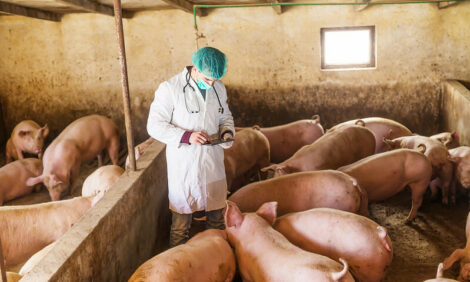



Pig Farm Closures Likely as EU Sow Stall Ban Nears
CYPRUS - A large number of pig farmers may be forced to shut down for failing to comply with an EU directive on animal welfare effective from January, stakeholders have said.Both the closing down of the farms and the new regulations will almost inevitably force up the price of pork, according to Cyprus Mail.
As of January 1, 2013, pregnant sows will not be allowed to be kept in individual gestation stalls, as has been standard practice so far. They will instead be kept in group pens, allowing them to freely move around during their pregnancy. Farmers use 'sow' stalls in intensive pig farming to help with often fraught feeding times and deal with aggression such as ear-biting. But animal welfare campaigners say sows suffer psychologically from being separated from other animals, and are hit by ailments such as lameness. The stalls are so narrow and constricting that sows can only stand up to eat and then lie back down.
While animal welfare groups across Europe have welcomed the move, many member states predict that the cost of applying the ban will force more breeders out of the sector, leading to lower output and higher pork prices. The European Commission expects only 17 out of the 27 member states to fully comply by the end of the year, leaving more than a third of the bloc behind schedule despite the 11-year notice.
Cyprus is certain to be among those failing to meet the deadline.
"We still have a long way to go in this area. There are a lot of pig farms that have not adapted to the new directive," head of the pig farming department at ministry of agriculture, Petros Mavrommatis, told the Sunday Mail.
Cyprus has had a history of not complying with EU animal welfare directives. A previous directive which forced farmers to use larger chicken cages was not complied with on time, and the European Commission had given Cyprus an extension.
"The European Commission has said that we will not be giving any extensions this time around. The pig farms which have not adapted to the new directive will simply not be allowed to operate," said Mr Mavrommatis.
The veterinary services that are in charge of implementing and regulating the new rules were not prepared to release any information this week on how many farms have complied so far, even though the deadline is less than two weeks away, reports the newspaper.
In 2011, the vet services inspected 91 pig farms and found 77 farms that had not complied with regulations, according to their end of year report on their web site. But there was no breakdown of violations per regulation and no figure was given for breeding procedures violations.
Though there was funding available via the EU agricultural development scheme, only few farmers in Cyprus have applied, Mr Mavrommatis said.
He said that a few farmers are trying - even at the last minute - to benefit from the scheme but "that opportunity has effectively closed" for most who have not applied in the current period of 2007-2013, he said.
The scheme offered 60 per cent EU-funding to help farmers comply with regulations.
Giorgos Neophytou from the pig farmers' association said there was reason to be pessimistic anyway because the state's financial difficulties and uncertainty over the EU budget affected how much funding the pig farmers will actually receive.
Cyprus Mail reports that, according to the pig farmers' association, 15 pig farms have closed in the past 15 months. A number of factors have contributed to this decrease, including the pig welfare directive, and another EU directive involving the biological processing of waste.
Grain prices - that account for about a third of pig farmers’ cost - have also surged this year, coinciding with a harsh and austere financial climate.
The Pancyprian Pig Farmers Association highlights the injustice they feel the pig farmers are facing.
"What are pig breeders supposed to do? The veterinary services are pressuring the farms to make the changes, but the government won’t allow the farms to make them because of planning permission rules."
From the agriculture ministry, Mr Mavrommatis said that when planning permission licences were introduced in 1990, "many pig farms found themselves in areas where expanding or developing their farm was prohibited. Since the grounds of the farms need to be expanded in order to comply with the new regulations, many farms will inevitably have to close down".
Most pig farms are in the outskirts of Nicosia and have effectively become enclaves, surrounded by residential areas and other agricultural and farming zones, Mr Mavrommatis told Cyprus Mail.
N. Armenis's pig farm outside Limassol is one of the larger pig breeding units in Cyprus. They are in the final stages of making the changes, as could be seen from all the building material scattered on the grounds during a recent visit.
The owner of the pig farm, Kostas Armenis, explains the breeding process. Whilst pregnant sows have to now be kept in group pens, five days before they give birth they can still be taken to individual farrowing stalls. The new directive allows these stalls to remain mainly for the protection of the piglets. Because of the large size and weight of the sows, there is a risk that they can flatten their young when they lie down. It is also important to separate the sows during this period in order to avoid aggression and fighting, which may result in pig losses. The sows can only be kept in the farrowing stalls for a maximum of four weeks, after which they must be returned to their group pens.
Sows are also allowed to be kept in individual stalls during impregnation. A total of 95 per cent of insemination is artificial so the process is made easier if sows are in stalls where they cannot move around.
"The new regulations provide that each sow must have 2.25 square metres of space. How large the pens are depends on the pig farmers," Mr Armenis explained to Cyprus Mail. He estimates that the new directive will cost pig farmers a minimum of €500 per sow and predicts that many pig farms may have to close down, especially the smaller units. The interiors of pig farms need to be entirely re-designed and outdoor pens need to be created.
The agriculture ministry said that the cost to farmers varied, depending on the existing infrastructure and the size of the farm. But moving farms would be "very costly", Mr Mavrommatis said.
The European Commission predicted between 3.0 and 4.0 per cent of EU pig breeders would halt production next year. According to farm and industry officials, EU pig production would in turn fall 5.0 per cent over the next three years because of the sow stall ban - 1.0 per cent this year, 3.0 per cent in 2013 and 1.0 per cent in 2014.
While the impact will be felt across the full range of Europe's food products, quantifying the exact effect is hard, reports Cyprus Mail. As a benchmark, in France, pork prices already gained 24 per cent between May and September to €180 ($230) for 100 kilograms (220 lbs) due to the drop in output, according to French farm office, FranceAgriMer.
Yet most of the rise has not been felt on French food shelves so far and pork prices tend to wane as consumers opt increasingly for red meat and poultry-based dishes as part of year-end celebrations. The full extent of the sow stall ban will only be felt a few months later when all the piglets born before the move have been slaughtered.
The impact of the ban will differ widely by country. Britain, Sweden and Luxembourg have already banned the stalls. Britain, which put its ban in place in 1999, saw a 40 per cent fall in its herd over the last decade as its farmers were unable to compete with countries which did not use such stalls. Production this year is finally recovering. But output has been hit hard in Germany, the EU's largest pig meat producer with a market share of 25 per cent in 2010.
The extent to which the Cyprus pig farming industry and pork prices will be affected will be seen after the January 1 deadline. Pork prices this year have already risen, from between €2.90 and €5.20 per kilo last year to between €4.60 and €5.25 per kilo this year, the commerce ministry has said.
But because pork has been traditionally considered the cheap meat alternative in Cyprus, convincing the consumer to pay more for pork so that farmers account for increased production costs will be hard, Mr Mavrommatis told Cyprus Mail.

